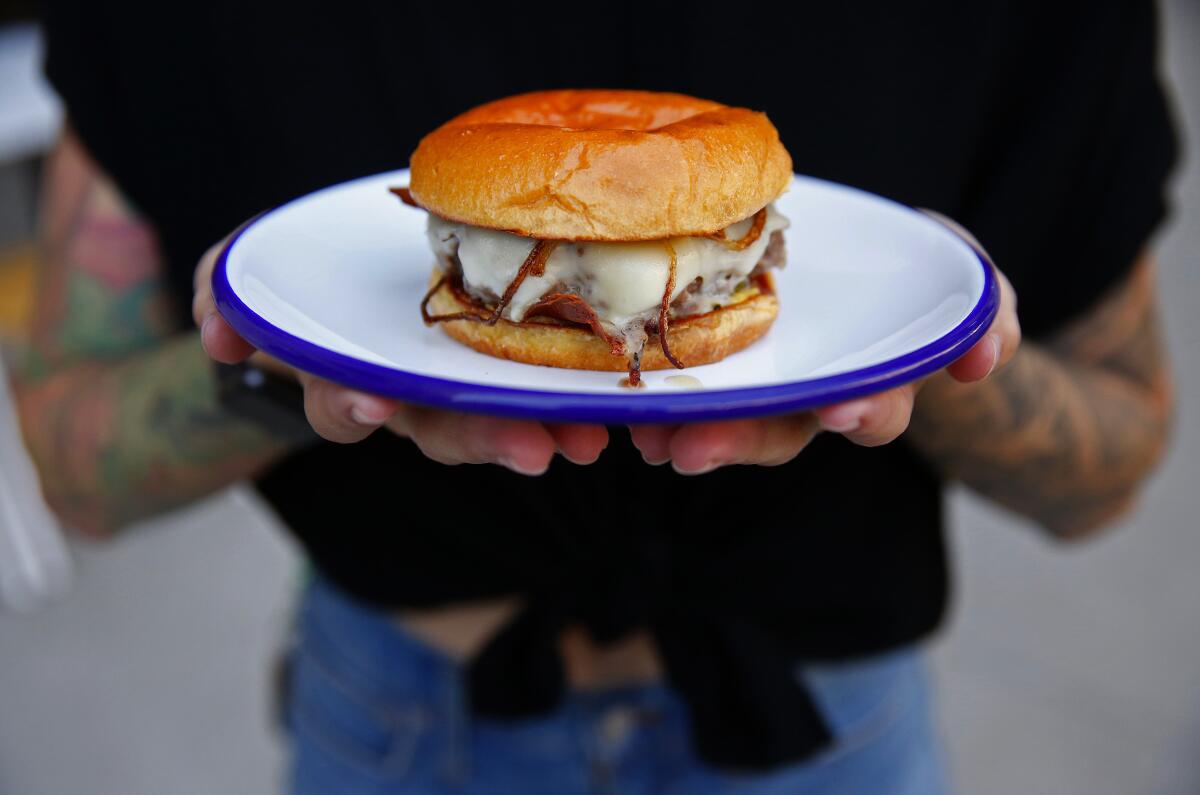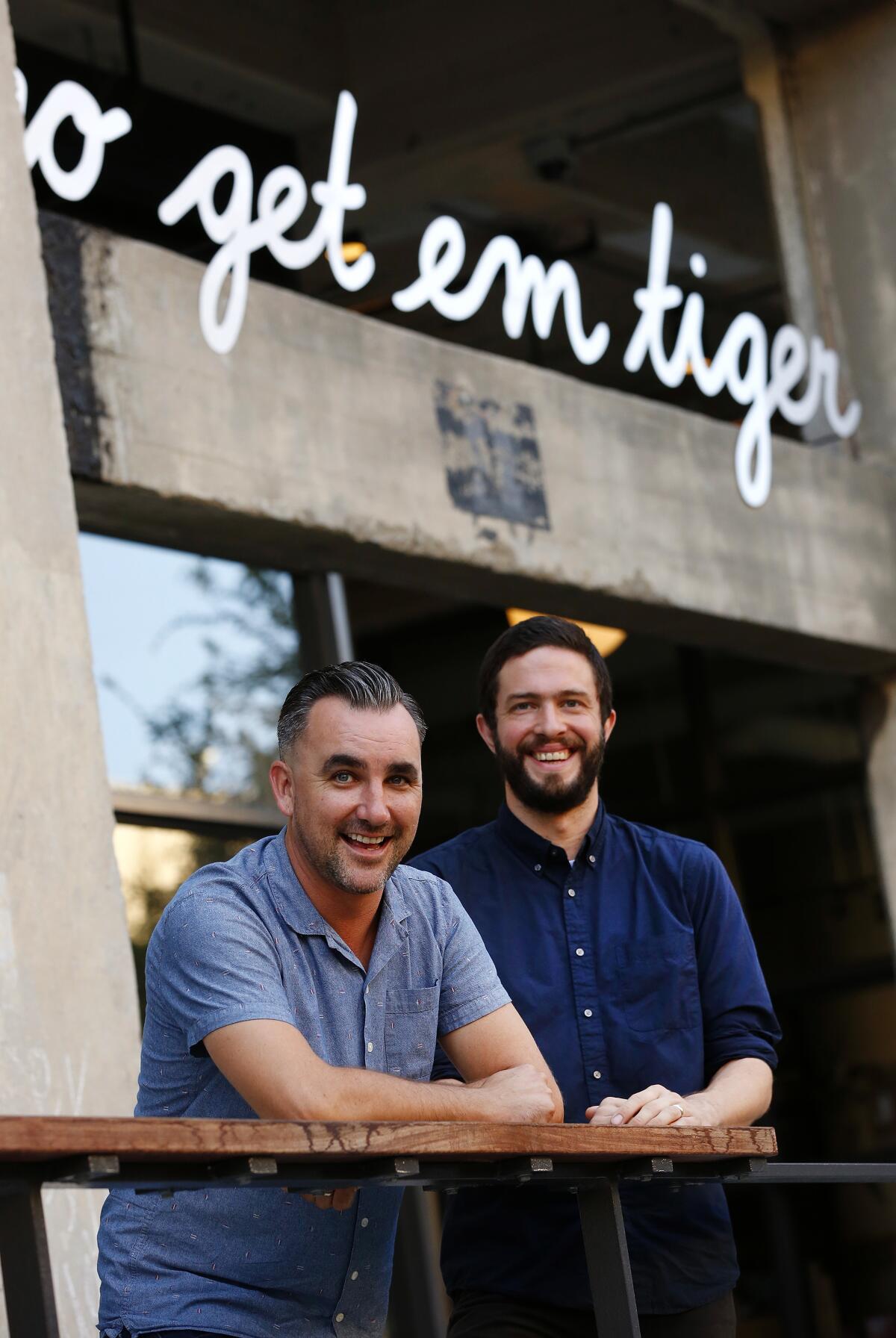Column: The PPP is letting our small restaurants and businesses die

Restaurants are among the hardest-hit businesses during the coronavirus shutdown. The National Restaurant Assn. estimates that 3 million restaurant employees lost their jobs in March, a month in which restaurants lost about $45 billion in revenue. The industry is bleeding out.
But while the airlines enjoy a $25-billion bailout, the CARES Act — a federal stimulus package for businesses and individuals affected by the coronavirus pandemic — and its centerpiece, the Paycheck Protection Program, is the equivalent of a Band-Aid — one of the small ones that goes around your finger.
It’s leaving local restaurants and other small business owners wondering: Where’s the money? In the meantime, large chains like Ruth’s Chris Steak House and Potbelly Sandwich Shop are allowed to suck the fund dry, having been granted multimillion-dollar loans.
The PPP is a Small Business Administration loan program designed to give small businesses financial relief. Businesses can apply for up to 250% of their monthly payroll: If your payroll is $100,000 per month, you can apply for a $250,000 loan. The loans are forgiven if 75% of the money is used to pay employees.
Sounds simple, right? In reality, it hasn’t worked out that way, particularly for smaller, independent businesses.
After opening applications on April 3, the SBA announced Thursday that the $350 billion earmarked for the program is gone, stating: “The SBA is currently unable to accept new applications for the Paycheck Protection Program based on available appropriations funding.”
That leaves many businesses, particularly clients of large banks who prioritize their wealthy clients, in the dark. Fewer than 6% of applicants have received their PPP loans, according to the website COVID Loan Tracker, which has compiled data from 15,000 small businesses. The hospitality industry has fared poorly; despite being among the hardest hit, only 9% of loan approvals have gone to “accommodation and food services,” according to the SBA.
The vast majority of the nation’s 30.2 million small businesses have been left flapping in the wind. Meanwhile, the rich get richer.
According to a public filing, Potbelly Sandwich Shop, a publicly traded company with 474 locations and 6,000 employees at the end of last year, was approved for $10 million in funds. Ruth’s Chris Steak House was approved for $20 million; it subverted the $10-million loan cap by applying through two subsidiaries, according to the SEC filing.
Banks, naturally, will profit. Collecting fees ranging from 1% for loans over $2 million to 5% for loans under $350,000, they stand to make billions from the PPP.
That’s left independent business owners bewildered, disappointed and angry.
Andy Ricker, the owner and chef of Thai restaurant chain Pok Pok, wrote that his loan application was on hold and that he and other small business owners had been “snookered by publicly traded companies who received millions and left independent small business in the gutter as the well ran dry.”
In Sonoma County, Crystal Nezgoda had a similar experience when she tried to receive money for her Honey Badger Coffee House in Rohnert Park.
“I applied for both the PPP loan and the disaster loan/grant and did not receive either one,” said Nezgoda, who has since started a GoFundMe.
Sonny Zaide, owner of Purple Cloud in Chicago, criticized the generous corporate loans on Twitter, writing, “Meanwhile people like me with *actual small businesses*, ie those of us single-person operators who just want a couple thousand just so we can actually feed our families, are SOL.”
I spoke to Jill James, owner of small business consultancy Sif Industries, and asked her if the PPP was providing relief for small businesses in need.
“No,” she said, “this has not been an effective program to put money in the hands of small businesses.”
James, through webinars and online offerings, says she’s worked with hundreds of small businesses over the last three weeks, including bars and restaurants. “None of them have gotten money.”
But why have loans for companies like Ruth’s Chris and Potbelly gone through, when there is so much need within the independent business community?
“I’ve spoken to bankers across the country,” James said. “One of the things the banks did first is put through larger loans.”
That has left smaller borrowers shut out.
“I haven’t seen anyone with an ask of less than $50,000 get funded,” she said. Freelancers and sole proprietors — which include businesses like caterers and food truck owners — are in an even worse position as they weren’t able to apply for funds until April 10, a week after loan applications officially opened. They “didn’t really get a fighting chance at all,” she said.
James herself is a small business owner. She also applied for a loan and has received nothing. “I’ve been waiting for eight days,” she said. “And I know what I’m doing.”
The waiting has been torturous. “It makes your confidence crater,” she said. “It makes you extremely unsure.”
It’s not the only instance of small-business owners being left wondering what happened. Go Get Em Tiger, the L.A. coffee chain (that happens to also serve some A-plus food), opened in 2013 and has 128 employees. In the last four years, it expanded to nine locations from two — a perfect example, in some ways, of a young, growing business.
Co-owner Kyle Glanville said he began thinking about how to put money into the bank even before Los Angeles Mayor Eric Garcetti announced the shutdown. He started applying for whatever loans he could get his hands on, hoping to amass a comfortable financial cushion to help weather whatever was about to come.
As for the PPP loan, he said he did everything by the book. Glanville got up at 4 a.m. the day applications for PPP loans opened and started hitting refresh on the computer. At 6 a.m., he was able to get through. By 6:20 a.m., he says, he had submitted it.
When the CARES Act was signed into law March 27, he allowed himself to feel a bit of optimism.
“I truly felt like they designed a program specifically for us,” he said.
Glanville contacted someone at Bank of America, GGET’s lender, who assured him: “You’re the first of my clients to get their work in and I imagine one of the first, period.” Approval seemed like a foregone conclusion. “We did all of our diligence, we made sure all of our information is accurate,” Glanville said. “We are the target company for this stimulus. Done!”
Days later, no word. A few people he knew who applied through smaller regional banks began seeing approvals. He began checking online and calling about the status of the loan — no updates, and no explanation. Meanwhile, the business, which has transitioned to pickup only, is bleeding money. “It’s completely dispiriting,” he said.
The money he applied for is needed more with each passing day. “We’ve managed to prop it up and keep some commerce going,” he said. “But only by virtue of not paying rent and deferring bills that will come due at some point. It’s an absolutely essential program for us.”

Glanville, like James, ticked off all of the boxes. He had an existing relationship with a major bank; he applied the morning the applications went live. If it’s this difficult for those experienced with the banking system, what about business owners without banking relationships or those who face language or cultural barriers?
James also emphasized the critical nature of injecting cash into a business quickly and how interminable waiting can cause irreversible damage.
“When you don’t get a loan on Tuesday or Wednesday, you have to make decisions. You don’t have days and weeks to wait,” she said. “It’s not just losing your cash; it’s losing your people who are the heart and soul of your business.”
What now? James said those who were not organized before have a chance to get organized now so they can apply if and when Congress opens up more money for small business owners. They also have time to choose a better funder — a regional bank, or online loan brokers like Kabbage or Fundera.
Those who already applied may be out of luck for now. “Unfortunately, as of this morning, if you don’t have an SBA guarantor number, you’re probably going to have to reapply,” James said. “The queues we had are out the window.”
Restaurants, more than any other kind of small business in this country, are symbols of promise. They’re frequently opened by immigrants and first-time business owners, non-English speakers, and others simply wishing to feed others and provide for their own families. For many, restaurants and small businesses are the quintessential entrée into the dream of creating a life in America and standing on one’s own two feet.
That dream is quickly dying, and our government has been particularly pitiless during this crisis. If we can bail out our bloated airlines, we can bail out our small restaurants. They need money, with few or no strings, and they need it fast. Otherwise, these beloved institutions that give our cities character and drive our economy will go away, and they won’t come back.
More to Read
Eat your way across L.A.
Get our weekly Tasting Notes newsletter for reviews, news and more.
You may occasionally receive promotional content from the Los Angeles Times.







